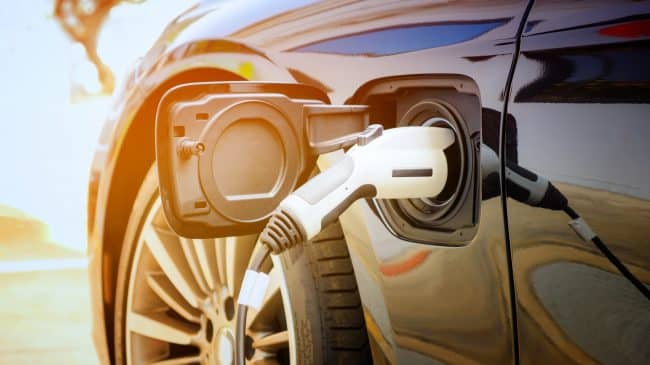In the United States, surface transportation infrastructure is funded, in large part, by the federal gas tax. Since 1993, the federal gas tax — $0.18 per gallon of gasoline and $0.24 per gallon of diesel — has remained the same.
Recently there have been talks of potentially increasing the federal gas tax to improve the nation’s roads and bridges. Earlier this year, President Donald Trump proposed increasing the gas tax by 25 cents a gallon to pay for the $1.5 trillion infrastructure plan he was calling for at the time. The political backlash was immediate. In an opinion piece in the Orange County Register, Republican Congresswoman Mimi Walters argued against Trump’s idea.
“Infrastructure improvements are critical to the future economic strength of our nation, but higher taxes are not the way to fund them, especially when government waste is so blatant,” Rep. Walters said. “I look forward to working with my colleagues on legislation that will responsibly fund infrastructure projects without increasing the federal gas tax a single penny.”
Some transportation experts argue that the debate over raising the gas tax misses the bigger picture and overlooks research suggesting the gas tax is becoming outdated. There are electric cars that don’t use gas and thus don’t pay gas taxes. Generally, newer cars and hybrid cars have become more fuel-efficient. While this is good for consumers, these developments can denigrate the revenue-raising power of the gas tax.
Over the last few years, many states have conducted research on switching from the gas tax to a mileage-based user fee (MBUF), also known as a vehicle miles traveled (VMT) fee. MBUFs are exactly what they sound like—consumers pay based on the number of miles driven, not the number of gallons of gasoline purchased. This can help mediate the differences in car fuel efficiencies, shifting payment to actual road use.
According to the National Surface Transportation Infrastructure Commission, “Direct user charges [like MBUFs] are the most viable and sustainable long term-user pay option for the Federal government.”
States like Oregon, Minnesota, Iowa, and others have recently conducted pilot projects to see how and if mileage-based user fees would work.
Oregon held two pilot programs for MBUFs (2006-2007 and 2012-2013) before the Oregon legislature created a statute-led third program in 2015 called the Road Usage Charge Program (RUCP) and also known as OReGO. The statute directed the Oregon Department of Transportation (ODOT) to give motorists choices for technologies in reporting miles driven, to offer participants private sector choices, and at least one non-GPS tracking method.
In 2017, ODOT released its findings from all three MBUF programs. The most important finding was “that the system works: charging drivers by the mile instead of [by the] gallon consumed is possible.” The study also found a few areas in which the program could improve. For example, the existing technology did not work in all cars or accurately distinguish between public and non-public roads. Still, the results were promising, and, in 2016, a survey found that the majority of Oregonians “agreed that a mileage-based system for transportation funding is fairer than other options presented.”
While MBUFS can distribute payment more fairly in regards to actual road use, the collection of these fees can raise privacy questions. In the Minnesota MBUF pilot project (2011-2012), participants had their miles tracked through a GPS application on their smartphones. Those in the Iowa pilot project (2010) had their miles tracked through onboard GPS units. While these participants volunteered for the pilot projects, understandably, not all Americans will want to volunteer private data. MBUF proponents argue privacy protocols will be put in place, but recent privacy breaches at Equifax, for example, remind us that privacy protocols cannot always ensure that private data remains private.
Oregon addressed these concerns in its 2012-2013 pilot and its OReGO option. Both of these programs included a variety of options, including non-GPS tracking options, to increase the chance that participants would find a “comfortable option.” Options included giving participants in-car units with no GPS capabilities and allowing participants to submit photographs of odometer readings. More research will have to be done to ensure all MBUF technology adequately meets privacy concerns.
States such as California, Indiana, Minnesota, Nevada and Washington have either conducted MBUF pilot projects or have authorized legislation to study them. MBUFs have a certain appeal, but they also raise some potential problems. Some argue that this fee will shift the burden onto those with a longer commute. While this seems possible, an Oregon State University study found that under MBUFs, “the increase for rural regions is less than the statewide average [in Oregon], while those in more urban areas will pay slightly more than the statewide average.” This is because those living in a rural region tend to drive less fuel-efficient cars than those living in urban areas.
Other variables can contribute to the success or failure of MBUFs. A 2011 study from the University of Minnesota found that MBUF success is highly dependent on external factors such as “[C]hanges in technology and the political climate, as well as the design and administration of the system.”
MBUFs may help increase funding for transportation projects, but the money still needs to be used wisely by states and transportation agencies. Multiple states will need to have functioning mileage-based user fee systems before the federal gas tax can be replaced by per mile fees. For now, mileage-based user fees are a promising state-level option to replace the gas tax. States should be looking for private sector partners that help implement the needed technology and privacy protections.

